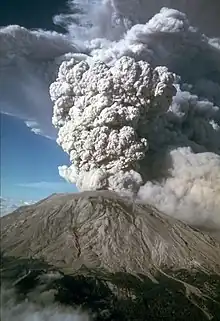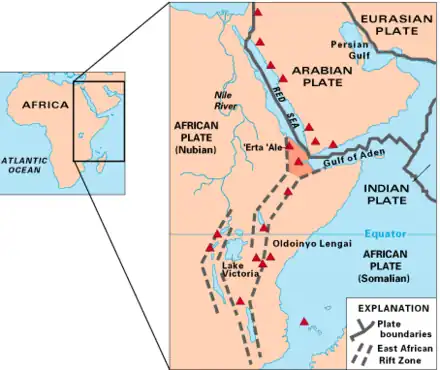List of active volcanoes
Active volcanoes are volcanoes which are erupting, or have erupted in modern times.[1] Many volcanoes have erupted dozens of times in the past few thousand years, but are not erupting at this moment. Some scientists consider a volcano active if it has erupted in the Holocene period (historic times).[2]

Most volcanoes live many thousands of years and erupt many times. However, most do not erupt even once in a human lifespan. Signs of unrest such as unusual earthquake activity or significant new gas emissions indicate that a volcano is active. An example of an active volcano is Mount St. Helens in the United States (US).[3]
There are more than 1,500 volcanoes that could be active today.[4] An estimated 500 million people live near active volcanoes.[5]
Planet Venus has more volcanoes than Earth. Some may be active.
Select list

There are active volcanoes in every part of the world. There are about 1,500 active volcanoes, many in the region of the Pacific Ocean.[6]
The Pacific "Ring of Fire" is an arc around the Pacific Ocean where there are 400+ volcanoes.[7]
Other regions

Other regions of active volcanoes include the Mediterranean Sea, the Atlantic Ocean and other places.
- Barren Island in the Andaman and Nicobar Islands of India[8]
- Erta Ale, Ethiopia
- Fuego, Guatemala
- Heard Island and McDonald Islands in Antarctica[9]
- Kilauea, Hawaii
- Lakagigar in Iceland[10]
- La Palma in the Canary Islands[11]
- Loihi, Hawaii
- Mount Erebus in Antarctica[12]
- Mount Etna in Italy
- Soufrière Hills on the Caribbean island of Montserrat[13]
- Stromboli in Italy[3]
- Teide in Spain (Canary Islands)
- Vesuvius in Italy
- Hunga Tonga–Hunga Haʻapai
Related pages
References
- The plural of volcano can be either volcanos or volcanoes. Both are equally correct, and it is not a matter of British vs US spelling. Oxford English Dictionary. Spelling on any particular Simple page tries to be consistent.
- "Volcanoes". U.S. Department of the Interior, U.S. Geological Survey.
- Ball, Jessica. "Voices: Dead or alive ... or neither? Why a dormant volcano is not a dead one," Earth Magazine (American Geosciences Institute). September 8, 2010. Retrieved 2012-6-14.
- "Sensing Remote Volcanoes". NASA Earth Observatory.
- "Volcanoes Archived 2010-11-22 at the Wayback Machine". Reuters. December 12, 2009.
- "Volcanoes Archived 2012-08-04 at the Wayback Machine". European Space Agency.
- Rosenberg, Matt. "Pacific Ring of Fire," Archived 2010-12-04 at the Wayback Machine About.com. Retrieved 2012-6-15.
- Global Volcanism Program, Smithsonian Institution.
- UNESCO, "Heard and McDonald Islands"; Australian government, "Heard Island and McDonald Islands, Landforms". Retrieved 2012-6-15.
- USGS, "Deadliest Volcanic Eruptions Since 1500 A.D.". Retrieved 2012-6-15. Archived 2012-05-31 at the Wayback Machine
- McGuire, Bill. "In the shadow of the volcano," The Guardian,October 15, 2003. Retrieved 2012-6-15.
- GVP, "Erebus" Archived 2006-07-08 at the Wayback Machine. Retrieved 2012-6-15.
- "'Ladies and gentlemen, on your left you will see an erupting volcano': The stunning sight Caribbean holidaymakers saw from plane," Daily Mail (UK). April 1, 2010. Retrieved 2012-6-14.